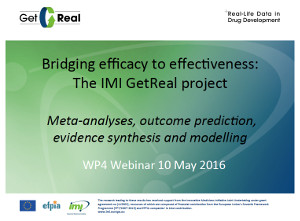May 10, 2016 – 15.00-16.00 CET (14.00-15.00 UK Time)
VIDEO & SLIDES
REPORT
Part of the IMI GetReal project has been devoted to establishing a coherent framework for assessing and bridging the efficacy-effectiveness gap between treatment outcomes in clinical trial and real-world populations. The focus of this webinar was on the use of network meta-analysis for evidence synthesis and on the extension of its conclusions in real-world settings, using predictive modelling.
Starting off the discussion was Matthias Egger, Director of the Institute of Social and Preventive Medicine (ISPM), University of Berne, Switzerland. “The GetReal consortium is really about developing an understanding amongst health care decision makers on how real world evidence could be used in drug development,” he noted. “Today we are going to talk primarily about how evidence synthesis and modelling can be used to bridge the efficacy-effectiveness gap.”
SPEAKERS

Matthias Egger,
Director of the Institute of Social and Preventive Medicine (ISPM),
University of Berne, Switzerland

Christine Fletcher
Executive Director Biostatistics,
Amgen Ltd

Eva-Maria Didden,
Postdoctoral research fellow at the ISPM,
University of Berne, Switzerland

Georgia Salanti
Associate Professor,
University of Ioannina School of Medicine
This webinar on “Synthesis and integration of real-world evidence in network meta-analyses and outcome prediction” will give the participants an understanding of important methodological key deliverables achieved by the IMI GetReal team. Part of the IMI GetReal project has been devoted to establishing a coherent framework for assessing and bridging the efficacy-effectiveness gap between treatment outcomes in clinical trial and real-world populations.
The focus of this webinar will be on the use of network meta-analysis for evidence synthesis and on the extension of its conclusions in real-world settings, using predictive modelling. A set of recommendations will be provided on how to simultaneously incorporate different sources of evidence into the analysis, i.e. randomized controlled trial and registry data on aggregated (summary) and individual participant basis. It will be shown how to extrapolate insights and findings when the studied interventions are adopted in a realistic setting. The proposed strategies will be substantiated by selected case studies.
PRE-READS
- Evidence Synthesis and Predictive Modelling: Literature Reviews and Follow-Up Research – Pre-reading material for WP4’s webinar, 10th May 2016
- GetReal in mathematical modelling: a review of studies predicting drug effectiveness in the real world
- Get real in individual participant data (IPD) meta-analysis: a review of the methodology
- GetReal: from efficacy in clinical trials to relative effectiveness in the real world
- GetReal in network meta-analysis: a review of the methodology
IN COLLABORATION WITH




